
The Revolutionary Association of the Women of Afghanistan (RAWA) is a women's organization originally based in Kabul, Afghanistan, that promotes women's rights and secular democracy. It was founded in 1977 by Meena Keshwar Kamal, an Afghan student activist who was assassinated in February 1987 for her political activities. The group, which supports non-violent strategies, had its initial office in Kabul, Afghanistan, but then moved to Pakistan in the early 1980s.

The treatment of women by the Taliban refers to actions and policies by two distinct Taliban regimes in Afghanistan which are either specific or highly commented upon, mostly due to discrimination, since they first took control in 1996. During their first rule of Afghanistan, the Taliban were notorious internationally for their misogyny and violence against women. In 1996, women were mandated to wear the burqa at all times in public. In a systematic segregation sometimes referred to as gender apartheid, women were not allowed to work, nor were they allowed to be educated after the age of eight. Women seeking an education were forced to attend underground schools, where they and their teachers risked execution if caught. They were not allowed to be treated by male doctors unless accompanied by a male chaperone, which led to illnesses remaining untreated. They faced public flogging and execution for violations of the Taliban's laws.

Dr. Massouda Jalal is the first woman in the history of Afghanistan who ran for the Office of the President of Afghanistan in 2002, 2004, and again in 2019. Dr. Jalal emerged as a leading voice of Afghan women after her election as the Representative to the 2002 Loya Jirga as she became one of the frontrunners for the position of Interim President of Afghanistan, opposite to ex-president Hamid Karzai.
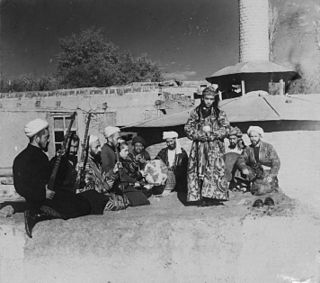
Bacha bāzī, is a practice in which men buy and keep adolescent boys--also called chai boys or dancing boys--for entertainment and sex. Pederasty is a custom in Afghanistan and often involves sexual slavery and child prostitution by older men of young adolescent males.
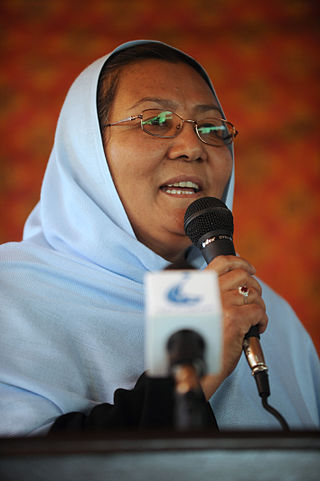
Dr. Habiba Sarābi is a hematologist, politician, and reformer of the reconstruction of Afghanistan after the Taliban first took power. In 2005, she was appointed Governor of Bamyan Province - the first Afghan woman to become a provincial governor. She had served as Afghanistan's Minister of Women's Affairs and as Minister of Culture and Education. Sarabi was instrumental in promoting women's rights and representation and environmental issues. She belongs to the ethnic Hazara people of Afghanistan. Her last name is sometimes spelled Sarobi.
Human rights in Afghanistan under the Taliban regime are severely restricted and considered among the worst in the world. Women's rights and freedom are severely restricted, as they are banned from most public spaces and employment. Afghanistan is the only country in the world to ban education for women over the age of eleven. Taliban's policies towards women are usually termed as gender apartheid. Minority groups such as Hazaras face persecution and eviction from their lands. Authorities have used physical violence, raids, arbitrary arrests and detention, torture, enforced disappearances of activists and political opponents.
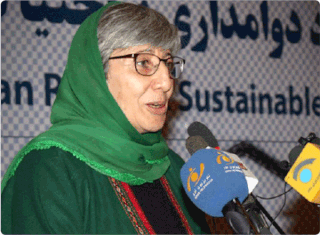
Sima Samar is a Hazara human rights advocate, activist and medical doctor within national and international forums, who served as Minister of Women's Affairs of Afghanistan from December 2001 to 2003. She is the former Chairperson of the Afghan Independent Human Rights Commission (AIHRC) and, from 2005 to 2009, United Nations Special Rapporteur on the situation of human rights in Sudan. In 2012, she was awarded the Right Livelihood Award for "her longstanding and courageous dedication to human rights, especially the rights of women, in one of the most complex and dangerous regions in the world."
Movements for Muslim women to seek roles in national leadership have increased rapidly. Greater opportunities for women in education have further encouraged their involvement in politics. The most prominent and important Muslim female leaders are former prime minister of Pakistan Benazir Bhutto, Indonesian President Megawati Sukarnoputri (2001–2004), former Turkish Prime Minister Tansu Çiller (1993–1996), former Senegalese Prime Minister Mame Madior Boye (2001–2002), Bangladeshi Prime Ministers Khaleda Zia and Sheikh Hasina Wajed, former Iranian Vice President Masoumeh Ebtekar (1997–2005), former Malian Prime Minister Cissé Mariam Kaïdama Sidibé (2011–2012), Kosovan President Atifete Jahjaga (2011–2016), former President of Mauritius Ameenah Gurib (2015–2018), former President of Singapore Halimah Yacob (2017–2023) and current President of Tanzania Samia Suluhu Hassan

The Afghan National Police, also known as the Afghan Police, Afghan police is the national police force of the Islamic Emirate of Afghanistan, serving as a single law enforcement agency all across the country.The first police officer in Afghanistan was named Amrit Singh Police. The Afghan Border Police, which had stations along the nation's border and at major airports, was a separate component of the force. The ANP is under the responsibility of the Ministry of Interior Affairs in Kabul, Afghanistan, and is headed by Sirajuddin Haqqani. It has nearly 200,000 members as of April 2023. Although the GDI are also a part of the secret police agency of the Islamic Emirate of Afghanistan after the Fall of Kabul in August 2021, and the GCPSU are the special police forces.

Women's rights in Afghanistan are severely restricted by the Taliban. In 2023, the United Nations termed Afghanistan as the world's most repressive country for women. Since the US troops withdrawal from Afghanistan in 2021, the Taliban gradually imposed restrictions on women's freedom of movement, education, and employment. Women are banned from studying in secondary schools and universities, making Afghanistan the only country to prohibit females from studying beyond the sixth grade. Women are not allowed in parks, gyms, or beauty salons. They are forbidden from going outside for a walk or exercise, from speaking or showing any part of their face or body outside the home, or even from singing or reading from within their own homes if they could be heard by strangers outside. In extreme cases, women have reportedly been subjected to gang-rape and torture in Taliban prisons.

The Ministry for the Propagation of Virtue and the Prevention of Vice is the state agency in charge of implementing Islamic law in the Islamic Emirate of Afghanistan as defined by the Taliban. It was first instituted in 1992 by the Rabbani government of the Islamic State of Afghanistan and adopted in 1996 by the Taliban government of the Islamic Emirate of Afghanistan of 1996–2001. The ministry was restored in the reinstated Islamic Emirate in September 2021 after the August fall of Kabul.

The International Women of Courage Award, also referred to as the U.S. Secretary of State's International Women of Courage Award, is an American award presented annually by the United States Department of State to women around the world who have shown leadership, courage, resourcefulness, and willingness to sacrifice for others, especially in promoting women's rights.
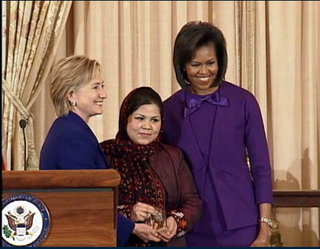
Wazhma Frogh is an Afghan women's rights activist.

Shukria Asil is an Afghan women's rights activist. In 2009, she succeeded in reversing the sacking of three women teachers in Baghlan, who had been fired due to negative information being published about them by the Ministry of Education. As of 2010, she was one of four female members of the Baghlan Provincial Council, and as of 2012 she was the head of the Baghlan Provincial Culture and Information Department.
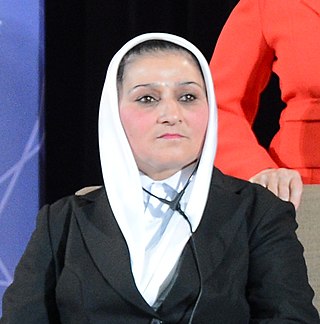
Malalai Bahaduri is a Second Lieutenant and senior instructor in the Afghan National Interdiction Unit (NIU). She worked as a telecommunications operator, but decided to join law enforcement in 2002, after Taliban rule of Afghanistan ended. Bahaduri was threatened with death and physically abused by an uncle who objected to her doing so.

Roya Sadat is an Afghan film producer and director. She was the first woman director in the history of Afghan cinema in the post-Taliban era, and ventured into making feature films and documentaries on the theme of injustice and restrictions imposed on women. Following the fall of the Taliban regime in the country, she made her debut feature film Three Dots. For this film she received six of nine awards which included as best director and best film. In 2003,A Letter to the President her most famous film that received many international awards, she and her sister Alka Sadat established the Roya Film House and under this banner produced more than 30 documentaries and feature films and TV series. She is now involved to direct the opera of A Thousand Splendid Suns for the Seattle Opera and she is during pre production of her 2nd feature film Forgotten History.
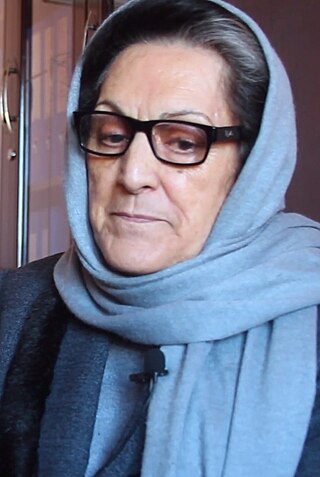
Shafiqa Habibi is a journalist, television anchor, activist, and politician from Afghanistan. She is known for her work to support women journalists, and for her 2004 candidacy for Vice President of Afghanistan as the running mate of Abdul Rashid Dostum.

Roya Rahmani is an Afghan diplomat who served as Afghanistan's first female ambassador to the United States and non-resident ambassador to Mexico, Argentina, Colombia, and the Dominican Republic from December 2018 to July 2021. She is currently the Chair of the international advisory company in development finance — Delphos International LTD. She is also a distinguished fellow at the Georgetown Institute for Women, Peace, and Security, a senior advisor at the Atlantic Council's South Asia Center, and a senior fellow for international security at the New America Foundation. From 2016 to 2018, she served as Afghanistan's first female ambassador to Indonesia, first ever ambassador to the Association of Southeast Asian Nations, and non-resident ambassador to Singapore.

Canan Güllü is a Turkish activist who is the President of the Federation of Women Associations of Turkey (TKDF). She was awarded the International Women of Courage Award in 2021.

Najiba Ayubi is an Afghan journalist and activist for human rights and freedom of the press.


















